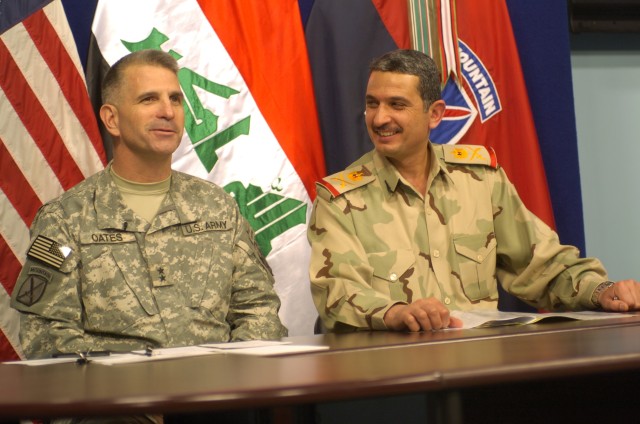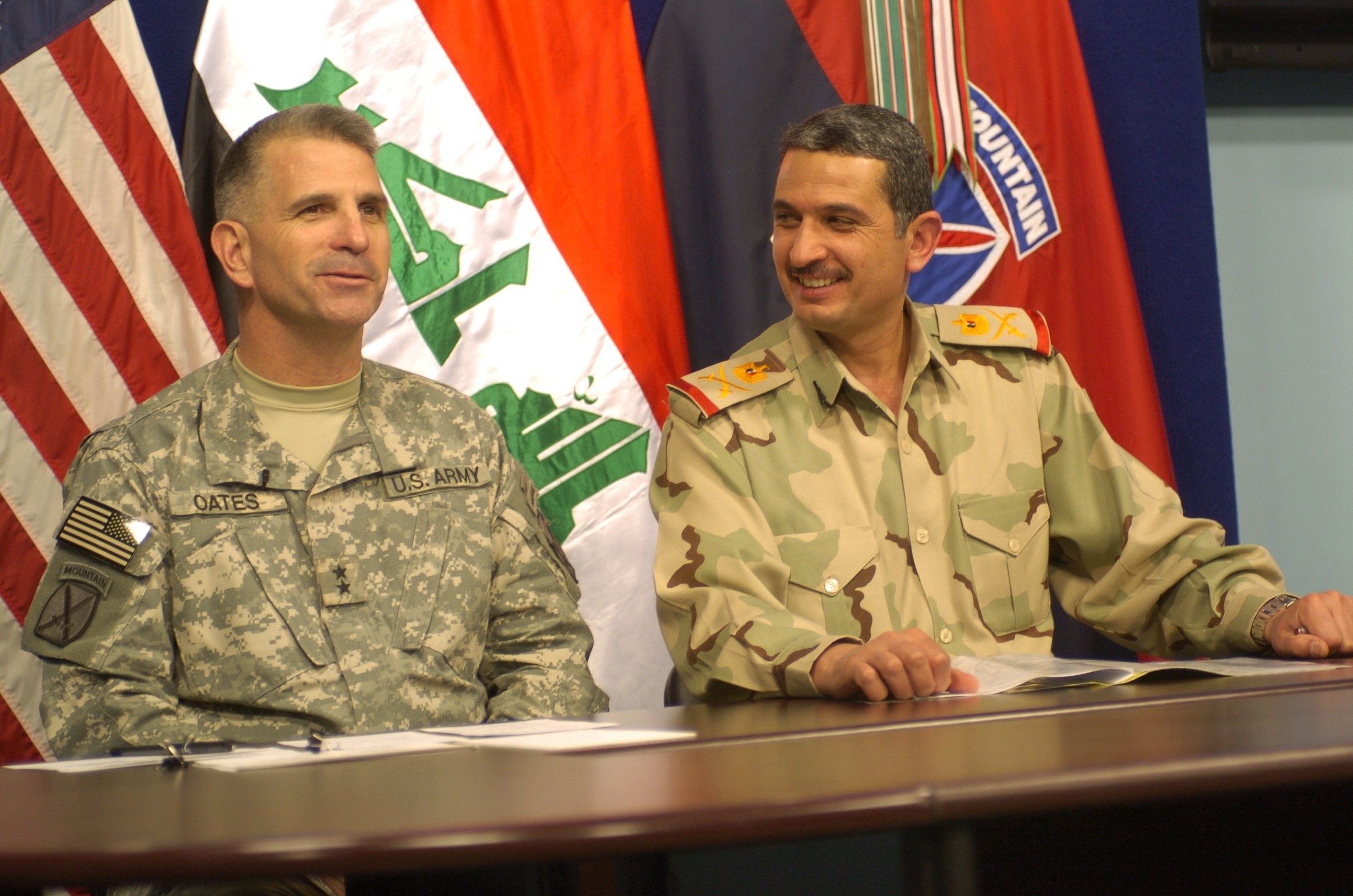BAGHDAD - One month "boots on the ground" is not enough time to reshape an army or transform a country. It is, however, long enough to show Maj. Gen. Michael Oates, Multi-National Division -- Center commander, a country heading in the right direction, with safer communities and committed military leaders.
"It's indisputable that the level of attacks is phenomenally low, and that's great development," Oates said during a Pentagon press conference at Camp Victory July 10.
Sitting beside the American general, Maj. Gen. Ali Salih Farhood Oothman said he too is witnessing safer communities and an improved security force.
"They don't face you in the field," Oothman, commander of the 8th Iraqi Army Division, said of the diminishing terrorists in Iraq. "They put IEDs and try to stab our forces from the back. The militia, the rebels, they can't face our Iraqi Army."
Oothman credits his Soldiers' proficiency to Coalition forces who trained them to successfully do their work. Likewise, Oates recognized the skill and talent of the Iraqi Security Forces.
"They are very capable," Oates said. "They are seeking initiative in planning operations ... I will say that my partner, General Oothman, operates in his area (needing) very little support from us."
Already, Oothman has battalions establishing full responsibility of security in Karbala and Najaf, and within days, they will take authority in al-Qadisiyyah.
"They're a learning organization, and the fact that they have been in combat now for five years, shows they've learned some very hard lessons and continue to improve," Oates said. "That's the mark of a professional organization. It doesn't keep making the same mistakes, and that's very encouraging."
Oates also noted maintenance programs making strides, military academies producing leaders ready to join the ranks and training programs matching Military Training Teams with IA units.
Still, Coalition forces must fill some capability gaps while ISF seek self-sufficiency. Oates said the Iraqi Air Force is coming along but still needs landing platforms and aircraft maintenance support from Coalition forces. Surveillance and reconnaissance operations are also conducted by the Coalition, as well as medical aid. The ISF lack the number of hospitals to care for their large number of service members.
"When he needs a certain capability ... he asks, and we provide," Oates said of Oothman.
Oates and the 10th Mountain Division (Light Infantry) took over for the 3rd Infantry Division in June. They've found a country where Iraqi people actually invited Coalition forces into their own homes; children play ball with Soldiers in the streets and welcome them to their schools.
Improved security in the communities allows the Iraqi Government to reopen court houses, build new schools, improve medical facilities, clean out canals, pave roads and fund other local projects. With violence on the decline, Coalition and Iraqi forces have been able to spend more time in the neighborhoods and gain trust in the people's eyes.
"Prior to this year, it was difficult for (ISF) to get around just as it was for us because of continuous attacks," Oates said. "They had to fight their way into neighborhoods. Now they can transit those neighborhoods pretty easily, stop and engage the population."
The ISF also have more time than ever to spend training, whether it's logistics, maintenance or other training needs. Furthermore, many Sons of Iraq members, originally used to secure checkpoints and fight insurgency, are now moving into the job field. Thanks to programs like the al-Kut vocational technical center and the Village of Hope, former SoI members study engineering and technical skills they use to further improve the future of Iraq.
As stability continues to improve, Oates said he looks forward to fair and safe elections; an improving economy; civic responsibility among leaders and politicians; an Iraqi Army that continues to gain professionalism; and more programs funded by the Government of Iraq.
Both leaders warned that the threat has not passed. Oothman warned of special militia forces which hide out in Iran and train to assassinate political and military leaders in Iraq. Oates said al-Qaeda groups in Iraq are still very vigilant and dedicated, and he emphasized Coalition and Iraqi forces will continue to seek out and kill members of any terrorist groups still present.
The dedication of the ISF and Coalition forces ultimately points back to true mission in Iraq: caring about those who matter most to a country, its people.
"What pleases me the most is seeing smiling faces of families with their children visiting the park because they know it's safe outside," Oothman said.


Social Sharing